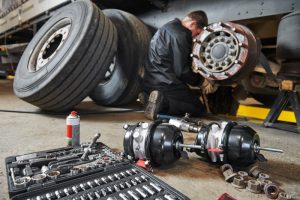What Are Truck Driver Training Requirements?
Everyone applying to be a commercial truck driver must obtain a commercial driver’s license (CDL) and complete the necessary skills and driving tests.
Commercial trucks are challenging to operate. Drivers must know how to maneuver them in dangerous conditions and respond appropriately in an emergency. An unlicensed or unqualified driver can cause an accident.
Requirements for Entry-Level Truck Drivers
 Prospective employees who plan to operate a commercial motor vehicle in interstate, intrastate, or foreign commerce must meet these federal requirements:
Prospective employees who plan to operate a commercial motor vehicle in interstate, intrastate, or foreign commerce must meet these federal requirements:
- Submit information required by the state to obtain a CDL
- Surrender all non-CDL licenses and commercial learner’s permits held in the state of employment
- Show proof of domicile for the state where the application is being submitted
- Certify the vehicle used during testing represents the motor vehicle they intend to or will operate
- Pass a driving or skills test in a motor vehicle representing the one they will or intend to operate and provide proof of completing the test successfully
- Meet requirements set by the Transportation Security Administration if applying for a hazardous materials endorsement
- Certify they don’t hold licensing in more than one state or jurisdiction, and disqualifications under state law or the disqualification of drivers regulation don’t apply
- Show documentation to prove citizenship or lawful permanent residency
- List states within the last ten years where they held a license to operate a motor vehicle
Entry-level truck drivers must receive instructions after applying for a CDL, such as:
- Driver qualifications – Commercial truck drivers must know about the responsibilities, medical exam procedures, disqualifications based on loss of driving privileges, orders, offenses, and other necessary qualifications to operate a commercial truck.
- Hours of service – Training should include how to handle fatigue while driving a commercial motor vehicle, the maximum limit for driving hours, maintaining a record of duty status, and the number of required off-duty hours.
- Driver wellness – Driver wellness information should include maintaining basic health, such as avoiding excessive alcohol use, eating a healthy diet, and exercising.
- Whistleblower protection – Every truck driver has a right to ask about safety practices without their employer terminating or reprimanding them.
Truck drivers receive a training certificate after completing their training. Employers must maintain a copy of the training certificate during the trucker’s employment and for one year after termination.
Regulations for Longer Combination Vehicle Drivers
A longer combination vehicle (LCV) is a type of combination truck/tractor. It consists of two or more trailers or semi-trailers with a gross vehicle weight of more than 80,000 pounds. LCV drivers operate these vehicles on the National System of Interstate and Defense Highways.
The training requirements for obtaining an LCV license include:
- Passing a knowledge and skills test successfully
- Showing the LCV instructor proof of meeting the general requirements
- Answering at least 80% of the knowledge test questions correctly
- Obeying traffic laws and avoiding being involved in a preventable accident while taking the skills test
- Demonstrating the ability to perform the skills necessary to operate an LCV
Who You Can Hold Liable for Injuries in a Truck Accident
 The truck driver isn’t the only person that can be at fault for a collision. Although the trucker was driving, other parties might be liable for your injury.
The truck driver isn’t the only person that can be at fault for a collision. Although the trucker was driving, other parties might be liable for your injury.
Motor carriers must perform thorough background checks on prospective drivers. They should confirm that the driver has proper licensing and successfully completes all required tests. They must also review driving records, employment history, and prior criminal offenses. A dangerous driver can end up behind the wheel of a commercial motor vehicle if an employer skips the background check or ignores the results.
You have a right to pursue legal action against the person or company responsible for the crash. You can recover compensation for your medical treatment, lost wages, and other expenses. The parties commonly held liable for truck accidents include:
- Vehicle or parts manufacturer
- Maintenance or repair worker
- Truck driver
- Motor carrier
- Owner of the trailer or cab
- Cargo loading company
Contact Sampson Law Firm Today
At Sampson Law Firm, we devote our time and effort to protecting people injured by the wrongdoing of others. We have fought for the rights of accident victims since 1997. Our goal is to resolve our clients’ cases favorably to help them heal and move forward with their lives.
If you sustained injuries in a truck accident due to someone else’s negligence, call us at (502) 584-5050 for a free consultation with an experienced Louisville truck accident lawyer. Let us help you hold the negligent driver or company liable and get the justice you deserve.
